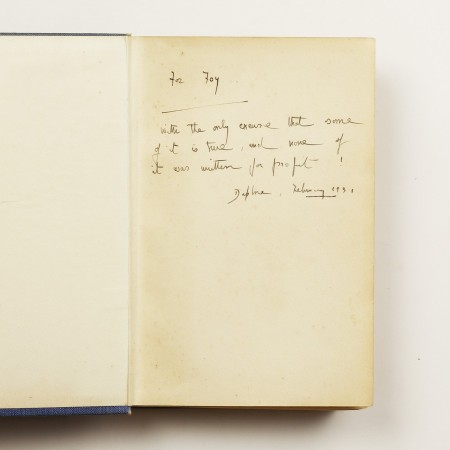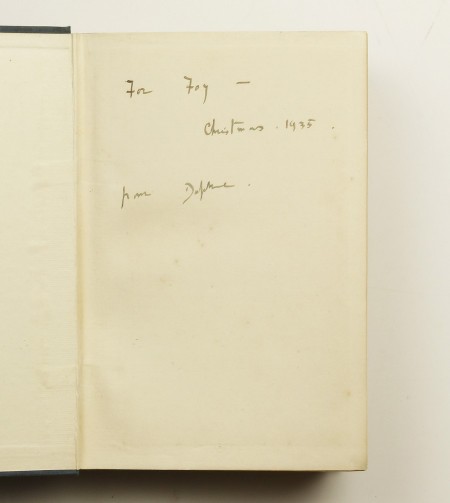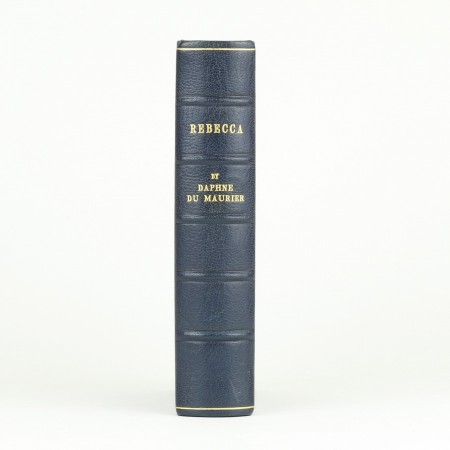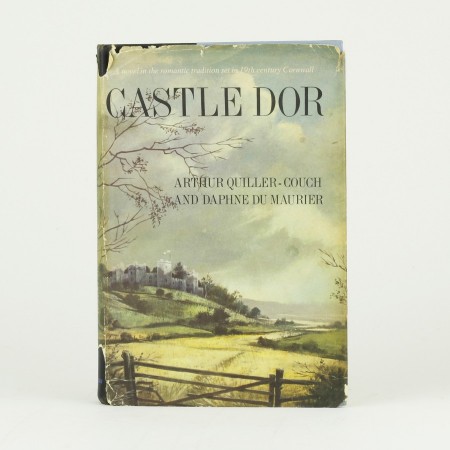“I have no talent for making new friends, but oh such genius for fidelity to old ones.”
Recently we acquired a wonderful collection of association copies of Daphne du Maurier’s books. They all come from the library of her very great friend, Foy Quiller-Couch and comprise three decades of lovingly inscribed first edition gifts from one friend to another.

As a young child Daphne du Maurier was often ill at ease in company and it seemed to visitors to the family home, particularly her parent’s theatrical friends, that Daphne was “silent, watchful and, most peculiar of all in that household, shy”. This shyness or unwillingness to “perform” in social situations remained with her for her entire life, and she always found it difficult to move into new social circles. Her friendships, when she found them, were therefore strong and constant. When she moved to Bodinnick, in Cornwall, in 1927 when she was just twenty, she soon met the Quiller-Couch family just across the estuary in Fowey. “It was a great day for me, when, after some preliminary gestures of friendship on the part of ... Foy, I was invited to Sunday supper.” This was the start of a friendship that was to last for a life-time. “Foy was eight years older than Daphne and led the life of a Victorian daughter at the Haven…but behind the dutifulness Foy was an independent spirit and Daphne quickly came to appreciate her finer points...” She described Foy and Lady Clara Vyvan, who Foy had introduced her to, as her two dearest friends “What curious friendships I make …. how I hate “nice” girls” They spent time together exploring the environs of the Cornish town of Fowey and Foy was undoubtedly aware of Daphne’s research into the history of a local family which was to lead to the writing of her first full length novel The Loving Spirit.

("some of it is true, and none of it was written for profit!" Foy's inscribed copy of The Loving Spirit)
Daphne frequently went over to the Haven where Foy’s father, Sir Arthur Quiller-Couch (often known simply as Q), became her friend and literary mentor. He encouraged Daphne in her writing, impressing on her the need for quality rather than simply ‘content’, and the fear of disappointing him made her fear his “disgust” when she wrote her second novel “I’ll Never Be Young Again” with its themes of sexual passion. However, the connection between Daphne and Q was an affectionate one and he even allowed her to use the title of one of his own short stories, Frenchman’s Creek, for her romantic novel of Cornish pirates in the time of Charles II. In appreciation she presented him with a copy of the novel when it was published in 1941.
(Frenchman's Creek inscribed to Sir Arthur Quiller-Couch)
The relationship between Foy and Daphne was obviously a close one and the two women maintained a long and loving correspondence, in which Daphne was able to air her concerns. “You are the greatest comfort to me always” and “if I was with you we'd be cutting wood and not talking at all.” They both enjoyed the often wild and stormy landscape of Cornwall, and would go horse riding over the moors, once famously staying at a lonely and atmospheric inn on a dark and wintery night, where the plot for Jamaica Inn began brewing. Thus this inscribed copy of the novel which Daphne sent to Foy as an early Christmas present in 1935 has particular resonance.

When Daphne’s husband, “Tommy” Browning , was posted to Egypt as commanding officer of the Grenadier Guards, Daphne went with him and began writing one of the greatest Gothic romances in twentieth century English literature. Despite being busy with writing, being a wife and mother and coping with the anxieties of army social life, she found time to present a lovingly inscribed copy of Rebecca to her great friend.

(Rebecca first edition inscribed "Foy with my love Daphne, August 1938")
When Foy was going through her father’s papers some years after his death in 1944, she came across an unfinished manuscript for a novel based on the Tristan and Iseult romance, a tale traditionally rooted in the areas around Fowey. Wanting the story to be completed by someone who understood both the area and the style of the original author, Foy turned to her great friend Daphne. With some trepidation, not wanting to fail either her friend or her mentor, Daphne finished the novel, titled Castle Dor, to such a successful degree that Foy commented in her preface to the novel, that Daphne had 'so cleverly woven her work into his, that I defy anyone to discover where the shuttle passed from his hand into hers'. Upon publication Daphne sent a copy to Foy, and the inscription, "For Foy - and the memory of the parents" serves as a reminder of the longevity and closeness of their association.

(Foy's inscribed copy of Castle Dor)
Daphne often described herself as being shy and awkward in social situations, and that she had “no talent for making new friends, but oh such genius for fidelity to old ones.” This remark could have been used to characterize her friendship with Foy. From the time of her first novel, The Loving Spirit, published in 1931 to the completion of Q’s novel Castle Dor in 1962, this collection shows the enduring nature of the contact and affection between the two women.
View the entire collection of books from Daphne to Foy.
Recent Posts
- The Evolution of Crime
- Tour The Bookshop On Your Screen
- The Genesis of Mr. Toad: A Short Publication History of The Wind In The Willows
- Frank Hurley's 'South'
- The "Other" Florence Harrison
- Picturing Enid Blyton
- Advent Calendar of Illustration 2020
- Depicting Jeeves and Wooster
- Evelyn Waugh Reviews Nancy Mitford
- The Envelope Booklets of T.N. Foulis
- "To Die Like English Gentlemen"
- Kay Nielsen's Fantasy World
- A Brief Look at Woodcut Illustration
- The Wealth Of Nations by Adam Smith
- What Big Stories You Have: Brothers Grimm
- Shackleton's Antarctic Career
- Inspiring Errol Le Cain's Fantasy Artwork
- Charlie & The Great Glass Elevator
- Firsts London - An Audio Tour Of Our Booth
- Jessie M. King's Poetic Art, Books & Jewellery
Blog Archive
- January 2024 (1)
- January 2023 (1)
- August 2022 (1)
- January 2022 (1)
- February 2021 (1)
- January 2021 (1)
- December 2020 (1)
- August 2020 (1)
- July 2020 (2)
- March 2020 (3)
- February 2020 (2)
- October 2019 (2)
- July 2019 (2)
- May 2019 (1)
- April 2019 (1)
- March 2019 (2)
- February 2019 (1)
- December 2018 (1)
- November 2018 (1)
- October 2018 (2)
